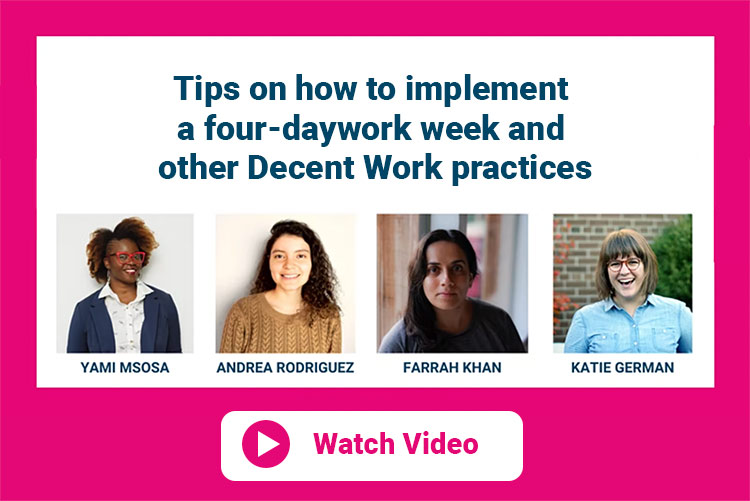Decent scheduling
Many programs in the nonprofit sector rely upon flexible and on-call scheduling to meet the needs of the people they serve. At the same time, the capacity of staff to plan their non-work activities, attend to personal and family needs, and attain a positive work-life balance depends on having reasonable ability to plan ahead. Decent scheduling is deeply connected to flexibility of working conditions. We appreciate that organizational needs of nonprofits vary from context to context.
We invite you to think about how practices of flexibility can support your scheduling practices.
What is workplace flexibility?
Workplace flexibility emphasizes the willingness and ability to adapt to change, particularly regarding how and when work gets done. In a flexible workplace, the needs of both employee and employer are met. Workplace flexibility is often used as a tool for retaining and engaging employees. It can also help an organization reach its goals thanks to improved productivity.
Alternate names: Flexible work arrangement, work-life balance
There are different types of workplace flexibility, including the following:
Informal flexibility
Informal flexibility is occasional, is agreed on between an employee and a manager, and has little impact on others in the workplace. It is important that with informal flexibility that clear processes are made available i.e. does the employee need to seek permission each time this arrangement is made.
Formal flexibility
Formal flexibility is typically an ongoing arrangement that is different from a team’s standard hours, and work location. It could include working remotely or a change in schedule.
Source: What Is Workplace Flexibility?
Examples of workplace flexibility:
- Allow staff to use a small percentage of their work week for self-care.
- Offer paid time off for volunteering.
- Allow staff to flex their hours within a week to attend appointments, errands, childcare etc
- Implement a 4-day work week.
One common misconception is that decent scheduling doesn’t take into account organizations that cannot offer flexibility due to service delivery or provision. Decent scheduling is not only about the hours of work, but also takes into account the need for work-life balance. According to Thrive At Work: Health Based Framework for Decent Work by the Wellesley Institute, “maintaining a workplace in which workers can reconcile work and their personal life helps to reduce the cumulative burden of multiple social roles. A lack of ability to manage personal and family needs can expose workers to stress-related illness that has been linked to higher cholesterol, worker burnout, depressive symptoms, and decreased overall health.”
Below you will find an assessment tool to support decent scheduling. We encourage you to use this tool, and adapt it based on your organizational needs.
| For program models that require changing shifts and schedules for staff, we set these schedules: | |
|---|---|
|
Weekly Biweekly Monthly If schedules need to change, how much notice are you giving employees within the organization? Note: Current best practices dictate notice that is between 2 weeks to one month in advance. |
|
| What flexible workplace practices is your organization engaged in? | |
| In what ways are employees able to give feedback to the scheduling process? | |
|
Does your organization use an equity calendar to support scheduling? |
|
| What is the process of accommodations available to staff around days of observance, religious, spiritual or otherwise? Is that information readily available and accessible? What are the practices around booking major organizational meetings? |
Interested in implementing a four-day work week?
You may have heard that organizations around the world are exploring the idea of a four-day work week. Is that possible in the nonprofit sector? With sector leaders, we discussed this topic, recruitment compensation models, and more!
During this webinar ONN covered the following topics:
- Strategies on how to overcome barriers and implement a four-day work week, recruitment compensation, and other Decent Work practices at a nonprofit.
- The value and positive impact of Decent Work practices on paid and unpaid workers.
- How to connect with and apply learnings from emerging leaders who are embedding Decent Work practices rooted in racial justice, intersectionality within their organizations.

Resources
- Tips on how to implement a four-day work week and other Decent Work practices
- Are four days really better than five? Future of Good asked five non-profits who’ve switched to a reduced work week
- Imagine Canada embarks on a 4-day work week pilot
- Exploring the 4-Day Work Week – IONS – Impact Organizations of Nova Scotia.
Future of work: Hybrid work structure
For many of Ontario’s nonprofits, the hybrid workplace became a reality in the early pandemic – the blend of in-office, in-person, and remote work offsite forced many nonprofits to reimagine the workplace. We know the flexibility of a partially or fully remote workplace is beneficial for many reasons that will outlast the pandemic.
There are both pros and cons to hybrid workplaces.
For example, organizations with hybrid workforces enjoy increased access to remote talent and higher retention rates, while employees appreciate the flexibility and view the option to work remotely as a form of compensation equal to any other in their benefits package. Despite the advantages, remote work also has the potential to reveal and exacerbate inequity in our workplaces, and create isolation for workers.
In our engagements with the nonprofit sector, we found that the majority of the nonprofit labourforce preferred the hybrid option. They saw it as directly linked to advancing decent work and racial justice.
How
Hybrid workplaces support the reduction of microaggressions, racism, and other forms of oppression in the workplace because folks have limited interaction with colleagues.
Hybrid workplaces support accessibility — for folks with disabilities, the ability to work from home as an option offers flexibility.


